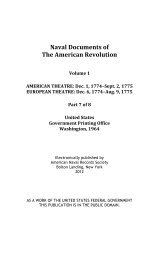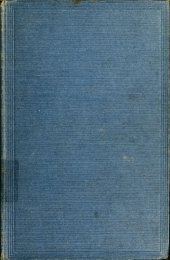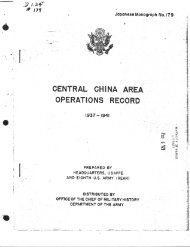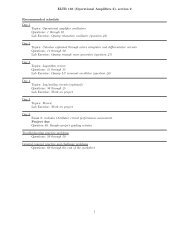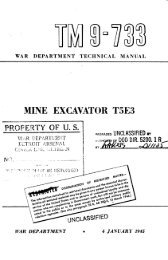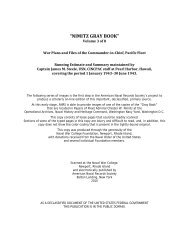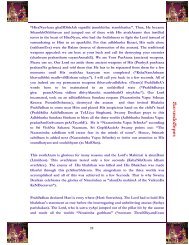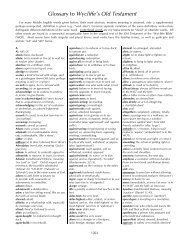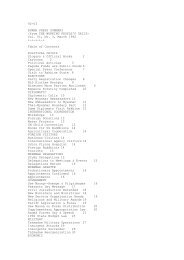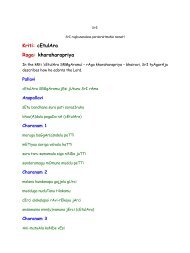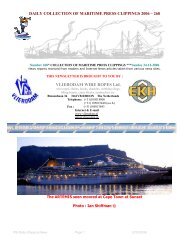Create successful ePaper yourself
Turn your PDF publications into a flip-book with our unique Google optimized e-Paper software.
94 ATLANTIC THEATER<br />
representative <strong>of</strong> those issued to marine <strong>of</strong>ficers zn charge <strong>of</strong><br />
detachments or ''guards'' as they were sometimes called, on board shIps<br />
<strong>of</strong> the U. S. Navy.<br />
1. Richard Peters, ed., Public Statutes at Large (Boston, 1861), I: '2) 25. 594 96.<br />
JANUARY- AUGUST 1812 95<br />
Health & Happiness attend you, & believe me to be very Respect·<br />
fully Your obI. Servt.<br />
Lieul. Alfred Grayson, <strong>of</strong> Marines.<br />
Franklin Wharton<br />
L,EUTENANT COLONEL COMMANDANT FRANKLIN WHARTON, U. S. M. C. ,<br />
TO SECOND L,EUTENANT ALFRED GRAYSON, U.S.M.C.<br />
H. Q. <strong>of</strong> the Marine Corps.<br />
Washington, April 8th 1812<br />
Sirl<br />
You will as soon as possible repair to Norfolk Virginia- and from<br />
thence proceed on board the Frigate Congress, commanded by Capt<br />
John Smith & report yourself to him, or in his Absence, the command·<br />
ing <strong>of</strong>ficer, as prepared to receive the Guard <strong>of</strong> Marines attached to said<br />
Frigate' - the Command being received, with all the Clothing, Arms, &<br />
Accoutrements belonging to it, you must particularly attend to the<br />
preservation <strong>of</strong> Desipline among the Men, to ensure a Military Con·<br />
duct from them; as I presume no duty will be exacted which could be<br />
unpleasant to you as the Officer <strong>of</strong> the Guard, or which would<br />
counteraCt it.<br />
You are too well acquainted with the application <strong>of</strong> the Clothing to<br />
the Soldier, to make necessary any remarks in regard to issues <strong>of</strong> it,<br />
by me, & in the pay Department I expect you equally in·<br />
formend- from the different Staff <strong>of</strong>ficers you will however receive<br />
Instructions, or regulation <strong>of</strong> their <strong>of</strong>fices, to which you must attend<br />
to prevent Embarrasment to yourself or them. I must here request<br />
you to Keep me informed <strong>of</strong> the state <strong>of</strong> your command, whenever<br />
your return to port will permit it.<br />
On receiving the Clothing, & such Returns as will ascertain the<br />
Accounts <strong>of</strong> the Men, as to the articles due, & shortly to become due<br />
to them, & a calculation made how far you can by that in store relieve<br />
their wants, you will report to me what you may consider as<br />
immediately essential for their Comfort (Fatigues excepted) that I<br />
may take proper steps to meet your requisition, whenever made on<br />
the Q. Master.<br />
Copy. DNA , RG127 , CMC, Letters Sent.<br />
I. Congreu, a 36-gun frigate, was authorized a marine detachment compri~d <strong>of</strong> one lieu <br />
(('nanl. twO strgeants. two corporals. one drummer, one fifer. and forty privatcs. The 44 ·gun<br />
frigates carried an additionallieuu:~nanl . ~rgeanl . corporal. and (en more privates S~ Callan &<br />
Ru~l1 . Laws . <strong>of</strong> the Navy . pp . 88 90.<br />
Nautz'lus on Embargo Patrol<br />
President Madison's embaTf!,o went into effect 011 4 April 1812 but<br />
was limited to a pen'od <strong>of</strong> 90 days. I A ccording to its terms, no ships<br />
belonging to citizens <strong>of</strong> the United States were to be allowed clearance<br />
for allY foreigll port unless departing in ballast. Naval and revenue ojficers<br />
were to enforce this law, and stiff penalties <strong>of</strong> up to a $20,000<br />
fine were to be inflicted on sc<strong>of</strong>flaws.<br />
There were several reasons for the passage <strong>of</strong> this legislation. Since<br />
war was considered to be i1nminent, an embargo would give most<br />
American slufts then at sea a reasonable period to retum from their<br />
trading voyages before risking capture by hostile warships. Secondly, it<br />
was assumed that if war were declared, it would not take place until<br />
the expiration <strong>of</strong> the embargo, and every minute <strong>of</strong> that time would be<br />
needed for war preparations. Thirdly, congressmen opposed to the war<br />
supported the measure as a delaying tactic allowing the British more<br />
tz',ne to consider concessions. Finally, as many 1nerchanls and seamen<br />
were engaged in shipping grain to British armies in Spain, it was hoped<br />
that this measure would sever trade with a potential enemy.'<br />
Secretary <strong>of</strong> the Navy Hamilton shouldered the major burden <strong>of</strong> en·<br />
forcing the embargo law at sea. He ordered his senior <strong>of</strong>ficers to<br />
dispatch patrols to seize illegal shIpping all along the coast. Com·<br />
modore John Rodgers, at New York, ordered Lieutenant William<br />
Crane, commander <strong>of</strong> the brig Nautilus, 14 guns, to patrol the<br />
entrance to Boston Bay and occasionally cruise northward along the<br />
Maine coast.



